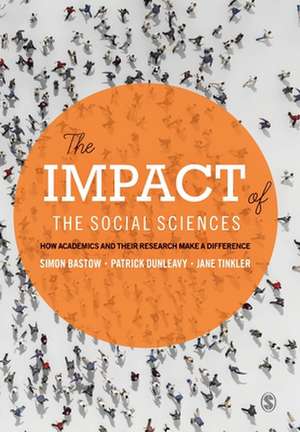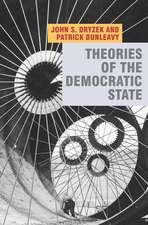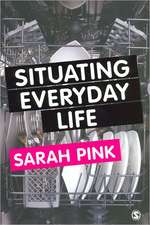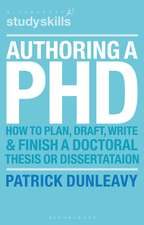The Impact of the Social Sciences: How Academics and their Research Make a Difference
Autor Simon Bastow, Patrick Dunleavy, Jane Tinkleren Limba Engleză Paperback – 19 ian 2014
Based on a three year research project studying the impact of 360 UK-based academics on business, government and civil society sectors, this groundbreaking new book undertakes the most thorough analysis yet of how academic research in the social sciences achieves public policy impacts, contributes to economic prosperity, and informs public understanding of policy issues as well as economic and social changes. The Impact of the Social Sciences addresses and engages with key issues, including:
- identifying ways to conceptualise and model impact in the social sciences
- developing more sophisticated ways to measure academic and external impacts of social science research
- explaining how impacts from individual academics, research units and universities can be improved.
This book is essential reading for researchers, academics and anyone involved in discussions about how to improve the value and impact of funded research.
Preț: 277.56 lei
Nou
Puncte Express: 416
Preț estimativ în valută:
53.12€ • 55.18$ • 44.12£
53.12€ • 55.18$ • 44.12£
Carte tipărită la comandă
Livrare economică 03-17 februarie 25
Livrare express 27 decembrie 24 - 02 ianuarie 25 pentru 81.42 lei
Preluare comenzi: 021 569.72.76
Specificații
ISBN-13: 9781446275108
ISBN-10: 1446275108
Pagini: 344
Ilustrații: illustrations
Dimensiuni: 170 x 242 x 14 mm
Greutate: 0.73 kg
Ediția:1
Editura: SAGE Publications
Colecția Sage Publications Ltd
Locul publicării:London, United Kingdom
ISBN-10: 1446275108
Pagini: 344
Ilustrații: illustrations
Dimensiuni: 170 x 242 x 14 mm
Greutate: 0.73 kg
Ediția:1
Editura: SAGE Publications
Colecția Sage Publications Ltd
Locul publicării:London, United Kingdom
Recenzii
The Impact of the Social Sciences is a very important book, because it shows the enormous impact the social sciences have made in business, government, and civil society. At a time when governments overly concentrate on science and engineering, they fail to understand that without the social sciences many of the physical science/technological advances would have little traction, particularly without an understanding of human and social behaviour and change. This is a must read for all, particularly decision makers in government and business.
The social sciences have tremendous impact potential. But in practice, our research community can take much more responsibility for generating a return on the public’s investment. Readable, relevant and evidence based, this book will inspire the research community to deliver greater impact.
Of all areas of academic research, the social sciences should be the most concerned with the question of impact, with how they affect the societies they study. This book is a valuable guide to the importance of social science research, and sets out a systematic approach to thinking about and measuring its different types of impact.
This ambitious, learned, and valuable book confronts fundamental questions about the scope of the social sciences, the character of its audiences, mechanisms of influence, criteria for assessment, and the impact of digital culture. Richly detailed and rigorously reasoned, this is a must read.
The new book from the LSE is timely. It provides a rich, empirical account. It is based on analyses of staffing data, profiles of the outputs and impacts of a sample of 270 researchers drawn from online sources, reviews from universities' websites, interviews with 100 researchers proactive in identifying the impact for their work, interviews with potential research users, published surveys and case studies of research/practice linkages, and revenue flows to researchers. The book is jargon-free, well-structured, with clear tables and revealing graphics, and some pertinent and witty quotations - all in all a model of research communication. It is accompanied by a website and through its production, it has been accompanied by a blog which continues...This work is a valuable contribution to understanding the often fraught research/practice relationship.
Deceptively compact, this data-rich book covers an enormous amount of territory beyond the scope of this review, and is an ideal starting point for anyone who is looking for a broad overview of the story of the social sciences in modern research, and the current, rapidly changing landscape within which the research impact agenda is situated. Although critical of many of the ways in which the impact agenda is currently being implemented, the authors encourage social scientists to seize the opportunity to demonstrate how much the social sciences can contribute to the economy and society.
The attention and time devoted to assessing the impact of social sciences research on public policy have been minimal at best. There have been previous attempts by other authors to disseminate this information, but this text – The impact of the social sciences: how academics and their research make a difference – is the first time a coordinated approach has really been utilized to comprehensively assess this area. In an era of diminishing funds for research, the impact that works such as this could have on the value that society places in social sciences research is immense… Social science research in general has immense research impact potential but it is in the domain of the current and emerging researchers to embrace the opportunities that this text highlights in order to reestablish, at least in the eyes of the public, the value and importance of research into human action. This book should be regarded as a seminal study that breaks new ground in how academics disseminate and communicate their research.
IMPACT is written in candid language and is well illustrated by figures and tablesenabling a wide audience to take advantage of its ideas and proposed courses ofaction. As a handy script IMPACT, taking advantage of the escalated recent progressin the various social science disciplines, opens new research agendas for social scientistsin order to relocate to a more meaningful field of study and research amongthe applied sciences. As such, IMPACT is a must for those involved in our environment,society’s wellbeing, economic growth and in orderly spatial development.
The research design is a wonderful example of quantitative and qualitative research, with the modelling of the determinants of impact done to a high level of sophistication and the case studies to a rich level of detail. The section on the demand for social science research amongst users shows a thorough knowledge of the policy process, as well as a good understanding of the variety of different kinds of beneficiaries who might be interested in social science research.
The social sciences have tremendous impact potential. But in practice, our research community can take much more responsibility for generating a return on the public’s investment. Readable, relevant and evidence based, this book will inspire the research community to deliver greater impact.
Of all areas of academic research, the social sciences should be the most concerned with the question of impact, with how they affect the societies they study. This book is a valuable guide to the importance of social science research, and sets out a systematic approach to thinking about and measuring its different types of impact.
This ambitious, learned, and valuable book confronts fundamental questions about the scope of the social sciences, the character of its audiences, mechanisms of influence, criteria for assessment, and the impact of digital culture. Richly detailed and rigorously reasoned, this is a must read.
The new book from the LSE is timely. It provides a rich, empirical account. It is based on analyses of staffing data, profiles of the outputs and impacts of a sample of 270 researchers drawn from online sources, reviews from universities' websites, interviews with 100 researchers proactive in identifying the impact for their work, interviews with potential research users, published surveys and case studies of research/practice linkages, and revenue flows to researchers. The book is jargon-free, well-structured, with clear tables and revealing graphics, and some pertinent and witty quotations - all in all a model of research communication. It is accompanied by a website and through its production, it has been accompanied by a blog which continues...This work is a valuable contribution to understanding the often fraught research/practice relationship.
Deceptively compact, this data-rich book covers an enormous amount of territory beyond the scope of this review, and is an ideal starting point for anyone who is looking for a broad overview of the story of the social sciences in modern research, and the current, rapidly changing landscape within which the research impact agenda is situated. Although critical of many of the ways in which the impact agenda is currently being implemented, the authors encourage social scientists to seize the opportunity to demonstrate how much the social sciences can contribute to the economy and society.
The attention and time devoted to assessing the impact of social sciences research on public policy have been minimal at best. There have been previous attempts by other authors to disseminate this information, but this text – The impact of the social sciences: how academics and their research make a difference – is the first time a coordinated approach has really been utilized to comprehensively assess this area. In an era of diminishing funds for research, the impact that works such as this could have on the value that society places in social sciences research is immense… Social science research in general has immense research impact potential but it is in the domain of the current and emerging researchers to embrace the opportunities that this text highlights in order to reestablish, at least in the eyes of the public, the value and importance of research into human action. This book should be regarded as a seminal study that breaks new ground in how academics disseminate and communicate their research.
IMPACT is written in candid language and is well illustrated by figures and tablesenabling a wide audience to take advantage of its ideas and proposed courses ofaction. As a handy script IMPACT, taking advantage of the escalated recent progressin the various social science disciplines, opens new research agendas for social scientistsin order to relocate to a more meaningful field of study and research amongthe applied sciences. As such, IMPACT is a must for those involved in our environment,society’s wellbeing, economic growth and in orderly spatial development.
The research design is a wonderful example of quantitative and qualitative research, with the modelling of the determinants of impact done to a high level of sophistication and the case studies to a rich level of detail. The section on the demand for social science research amongst users shows a thorough knowledge of the policy process, as well as a good understanding of the variety of different kinds of beneficiaries who might be interested in social science research.
Cuprins
1. The Social Sciences in Modern Research
The scale and diversity of the social sciences
The social sciences and human-dominated systems
Perceptions of ‘impact’ from the social sciences
PART I: HOW ACADEMICS ACHIEVE EXTERNAL IMPACTS
2. Social Scientists' Pathways to Impacts
The academic impacts of social science researchers
The external impacts of researchers
Profiling different types of academic and their impacts
3. Modelling the Determinants of Social Science Impacts
Multi-variate modelling of impacts
The factors shaping academic impacts
The factors shaping external impacts
4. Comparing Individuals' Impact
Using case studies of high impact academics
Explaining high impacts at the individual level
Pulling together the analysis
PART II: THE DEMAND FOR SOCIAL SCIENCE RESEARCH
5. Business and the Corporate Sector
The range of university links with business
The scale of social sciences involvement with business
Barriers to greater use of social science research in firms
6. Government and Public Policy Making
Social science and the policy arena
The scale of social science links to policy
Social scientists’ influence on policy
7. Civil Society Organizations and the Third Sector
Civil society organizations and ‘advocacy coalitions’
The scale of social science research links to civil society
Growing the impacts of social science in the third sector
8. The Media and Public Engagement
Academic expertise and ‘the public’
Social scientists and conventional news media
Social science and social media
Innovating with social science and the media
PART III: PATTERNS OF KNOWLEDGE AND IMPACTS
9. The Dynamic Knowledge Inventory and Research Mediation
The dynamic knowledge inventory
The mediation of social science research
10. Social Science for a digital era
Joining up for a ‘broad-front’ social science
Re-framing human-centred disciplines and integrating STEM and social sciences
Towards a more global social science
The scale and diversity of the social sciences
The social sciences and human-dominated systems
Perceptions of ‘impact’ from the social sciences
PART I: HOW ACADEMICS ACHIEVE EXTERNAL IMPACTS
2. Social Scientists' Pathways to Impacts
The academic impacts of social science researchers
The external impacts of researchers
Profiling different types of academic and their impacts
3. Modelling the Determinants of Social Science Impacts
Multi-variate modelling of impacts
The factors shaping academic impacts
The factors shaping external impacts
4. Comparing Individuals' Impact
Using case studies of high impact academics
Explaining high impacts at the individual level
Pulling together the analysis
PART II: THE DEMAND FOR SOCIAL SCIENCE RESEARCH
5. Business and the Corporate Sector
The range of university links with business
The scale of social sciences involvement with business
Barriers to greater use of social science research in firms
6. Government and Public Policy Making
Social science and the policy arena
The scale of social science links to policy
Social scientists’ influence on policy
7. Civil Society Organizations and the Third Sector
Civil society organizations and ‘advocacy coalitions’
The scale of social science research links to civil society
Growing the impacts of social science in the third sector
8. The Media and Public Engagement
Academic expertise and ‘the public’
Social scientists and conventional news media
Social science and social media
Innovating with social science and the media
PART III: PATTERNS OF KNOWLEDGE AND IMPACTS
9. The Dynamic Knowledge Inventory and Research Mediation
The dynamic knowledge inventory
The mediation of social science research
10. Social Science for a digital era
Joining up for a ‘broad-front’ social science
Re-framing human-centred disciplines and integrating STEM and social sciences
Towards a more global social science
Notă biografică
Simon Bastow is Senior Research Fellow at the Department of Government at the London School of Economics and Political Science, and LSE Public Policy Group. His research interests are in governance and executive politics, UK and comparative public policy, and impacts of social science.
Descriere
This book provides a timely and expansive study on the subject of the impact that academic social science has across a broad societal canvas, including on government and public policy, commerce and business, and the third sector and public engagement.









